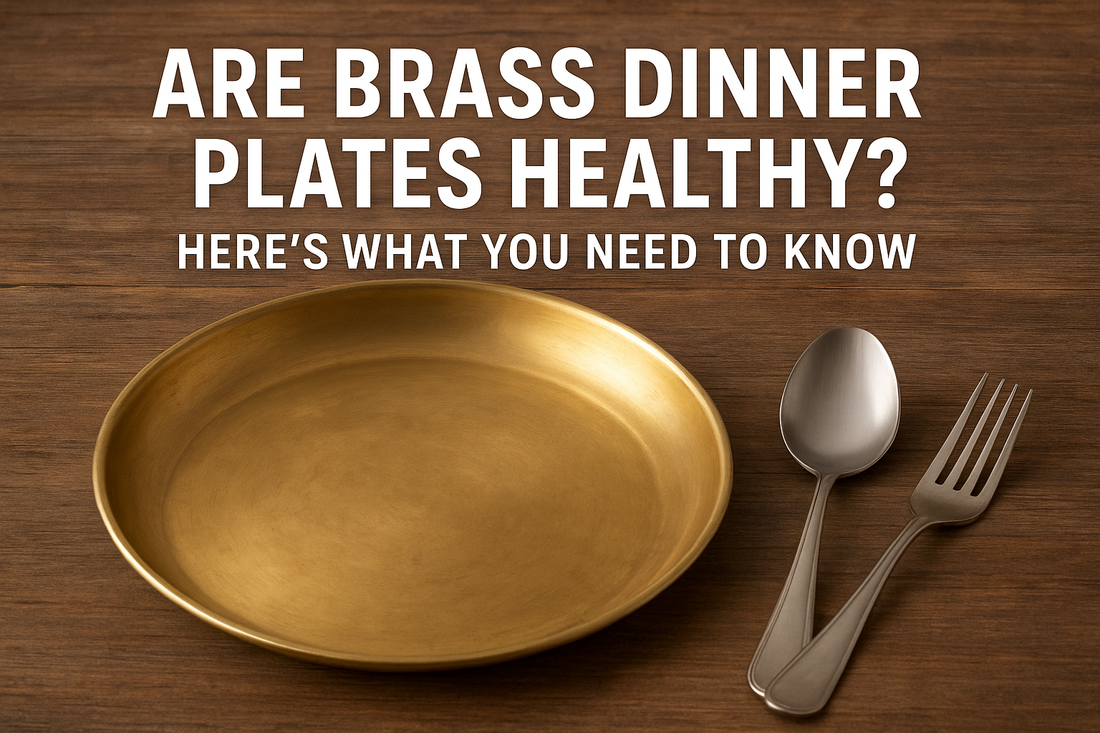Where food is concerned, the vessel you cook or eat from is as good as the food. Brassware—commonly referred to as pital ke bartan—has been an old tradition at homes in India. Brass dinner plates occupy a distinguished place among them. They are not only good-looking and robust but also believed to possess medicinal properties. But are brass dinner plates beneficial for health after all, or just an old tale that's been going around? Let's dig deeper.
A Short Introduction of Brass Utensils in Indian Culture
Brass is an alloy of copper and zinc. These two combine to create a hard substance that is made into cooking vessels, containers for storing food, drinking water containers, and brass dinner plates. Ayurveda believes that consuming food from brass plates will balance out the three doshas—Vata, Pitta, and Kapha—and improve your digestion.
Brassware had once beautified nearly every Indian kitchen: brass kadai, brass pressure cooker (pital ka cooker), storing containers for water, and dinner plates. Brass started losing its sparkle when stainless steel cookware and newer varieties hit the market. Today, brass is once more gaining its sparkle.
Is a Brass Dinner Plate Healthy?
The short answer: Yes, but with precautions.
1. Trace Mineral Benefits
Chewing brass dinner plates may actually make our body take up tiny amounts of trace nutrients. Copper is good for us. So is zinc.
- Copper fortifies immunity, supports the formation of red blood cells, and aids brain health.
- Zinc facilitates metabolism, heals fast, and promotes skin quality.
Whereas the amount leaching from brass dinner plates to foodstuffs is small, there may be a small beneficial effect over a period of time.
2. Aids Digestion
Ayurveda says that eating from brass dishes can help produce bile and make gut health better. It is believed that food served on brass dinner plates stays warm longer and keeps its smell.
3. Long-Lasting & Eco
Unlike plastic plates, brass is non-toxic, sustainable, and 100% recyclable. Using brass dinner plates reduces dependence on harmful synthetic materials.
4. Anti-Microbial Activity
Brass is itself anti-bacterial because of its copper content. Keeping food or serving food from brass dinner plates could be lower in bacterial contamination than from plastic or melamine plates.
Precautions You Must Know
Although brass dinner plates are good for your health, there are certain precautions:
-
Not for acidic foods
Do not serve very sour dishes like lemon rice, curd, tamarind dishes, etc., on brass dinner plates. The acid will react with brass by discoloring them and giving out harmful substances. -
Routine tin plating (Khalai)
Earlier, brass dinner plates were plated over with tin (kalai) before use. If your brass dinner plates haven't been plated over like that, handle them gently and do not use them for servings that have acid. -
Proper Cleaning
Do not use strong chemicals for washing. Utilize natural cleaners like tamarind, lemon, or flour with salt. This preserves shininess and does no damage. -
Check for Authenticity
It may not be pure from stores if the demand is high. Always purchase from trusted sellers.
More General Brass Tools
1. Brass Kadai
A brass kadai is usually employed for deep-frying or preparing dry veg dishes. Broad bottom spreads the heat nicely, ensuring your food gets cooked uniformly everywhere.
2. Brass Pressure Cooker (Pital ka Cooker)
Brass pressure cooker, otherwise known as pital ka cooker, was extremely popular in olden residences before steel and aluminum were incorporated. It maintains heat for a longer stretch of time and is known to develop the flavor of the curry.
3. Brass Storage Pots
Brass vessels were also kept for water and grains earlier. Some households even keep water in brass vessels even today because people feel that it will automatically cleanse the water as well as revitalize the water.
Brass Plates Differ from Other Dinner Plates
- Stainless Steel: Durable, low-maintenance, but does not offer the trace mineral content of brass.
- Copper: Extremely useful but leaches too readily into food if not correctly lined.
- Plastic/Melamine: Inexpensive but unhealthy, especially if served with hot food.
- Ceramic/Glass: Safe but fragile.
Dinner plates made of brass dinner plates are durable, good for health, and of long vintage.
FAQs About Brass Dinner Plates
Q1. Is eating from brass dinner plates every day possible?
Yes, you can, provided you avoid highly acidic foods and clean them properly.
Q2. Does food served from brass dinner plates taste differently?
These will add flavor moderately by retaining heat longer but will not greatly alter flavor.
Q3. Can children eat in brass dinner plates?
Yes, but make sure the plates are maintained well and coated appropriately to avoid any incidental reactions.
Q4. Is brass any better than stainless steel?
Both have their share of advantages and disadvantages. Brass has its health benefits but stainless steel is more maintainable.
Q5. How do I care for my brass dinner plates?
Polish frequently with natural cleaners, avoid harsh acids, and store in a dry location to prevent tarnishing.
Final Thoughts
Is brass dinner plates good for your health? Yes—if you use them appropriately, they will be an excellent addition to your kitchen. Brass dinner plates are robust, classic, and provide you with few health advantages that newer plates do not always offer.
Similar to brass kadai, brass pressure cooker, and pital ka cooker, these do bring back our great culture. If you are considering purchasing brass dinner plates, ensure you acquire genuine good-quality plates and maintain them well. Some day, they will not only serve you good food but also connect you with a greener, healthier lifestyle.
Disclaimer
This article is for informational purposes only. Brass utensils' health effects, such as brass dinner plates, are from ancient practices, Ayurvedic manuscripts, and the way we use them culturally. They do not substitute for professional advice from your physician. Always consult an appropriate healthcare professional before altering your diet, utensils, or way of living.

